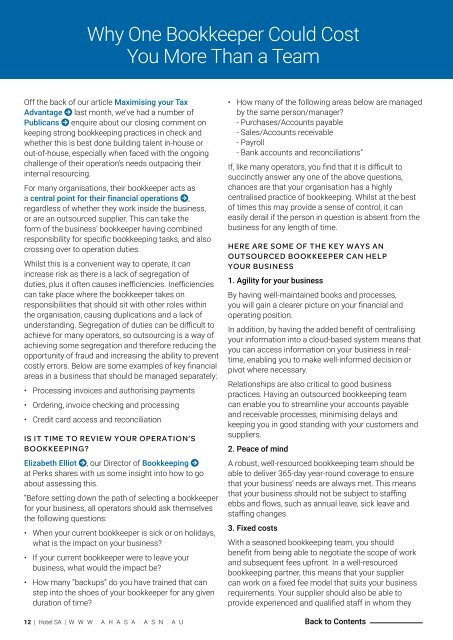HSA June 21
Create successful ePaper yourself
Turn your PDF publications into a flip-book with our unique Google optimized e-Paper software.
Why One Bookkeeper Could Cost<br />
You More Than a Team<br />
Off the back of our article Maximising your Tax<br />
Advantage last month, we’ve had a number of<br />
Publicans enquire about our closing comment on<br />
keeping strong bookkeeping practices in check and<br />
whether this is best done building talent in-house or<br />
out-of-house, especially when faced with the ongoing<br />
challenge of their operation’s needs outpacing their<br />
internal resourcing.<br />
For many organisations, their bookkeeper acts as<br />
a central point for their financial operations ,<br />
regardless of whether they work inside the business,<br />
or are an outsourced supplier. This can take the<br />
form of the business’ bookkeeper having combined<br />
responsibility for specific bookkeeping tasks, and also<br />
crossing over to operation duties.<br />
Whilst this is a convenient way to operate, it can<br />
increase risk as there is a lack of segregation of<br />
duties, plus it often causes inefficiencies. Inefficiencies<br />
can take place where the bookkeeper takes on<br />
responsibilities that should sit with other roles within<br />
the organisation, causing duplications and a lack of<br />
understanding. Segregation of duties can be difficult to<br />
achieve for many operators, so outsourcing is a way of<br />
achieving some segregation and therefore reducing the<br />
opportunity of fraud and increasing the ability to prevent<br />
costly errors. Below are some examples of key financial<br />
areas in a business that should be managed separately:<br />
• Processing invoices and authorising payments<br />
• Ordering, invoice checking and processing<br />
• Credit card access and reconciliation<br />
IS IT TIME TO REVIEW YOUR OPERATION’S<br />
BOOKKEEPING?<br />
Elizabeth Elliot , our Director of Bookkeeping <br />
at Perks shares with us some insight into how to go<br />
about assessing this.<br />
“Before setting down the path of selecting a bookkeeper<br />
for your business, all operators should ask themselves<br />
the following questions:<br />
• When your current bookkeeper is sick or on holidays,<br />
what is the impact on your business?<br />
• If your current bookkeeper were to leave your<br />
business, what would the impact be?<br />
• How many “backups” do you have trained that can<br />
step into the shoes of your bookkeeper for any given<br />
duration of time?<br />
• How many of the following areas below are managed<br />
by the same person/manager?<br />
- Purchases/Accounts payable<br />
- Sales/Accounts receivable<br />
- Payroll<br />
- Bank accounts and reconciliations”<br />
If, like many operators, you find that it is difficult to<br />
succinctly answer any one of the above questions,<br />
chances are that your organisation has a highly<br />
centralised practice of bookkeeping. Whilst at the best<br />
of times this may provide a sense of control, it can<br />
easily derail if the person in question is absent from the<br />
business for any length of time.<br />
HERE ARE SOME OF THE KEY WAYS AN<br />
OUTSOURCED BOOKKEEPER CAN HELP<br />
YOUR BUSINESS<br />
1. Agility for your business<br />
By having well-maintained books and processes,<br />
you will gain a clearer picture on your financial and<br />
operating position.<br />
In addition, by having the added benefit of centralising<br />
your information into a cloud-based system means that<br />
you can access information on your business in realtime,<br />
enabling you to make well-informed decision or<br />
pivot where necessary.<br />
Relationships are also critical to good business<br />
practices. Having an outsourced bookkeeping team<br />
can enable you to streamline your accounts payable<br />
and receivable processes, minimising delays and<br />
keeping you in good standing with your customers and<br />
suppliers.<br />
2. Peace of mind<br />
A robust, well-resourced bookkeeping team should be<br />
able to deliver 365-day year-round coverage to ensure<br />
that your business’ needs are always met. This means<br />
that your business should not be subject to staffing<br />
ebbs and flows, such as annual leave, sick leave and<br />
staffing changes.<br />
3. Fixed costs<br />
With a seasoned bookkeeping team, you should<br />
benefit from being able to negotiate the scope of work<br />
and subsequent fees upfront. In a well-resourced<br />
bookkeeping partner, this means that your supplier<br />
can work on a fixed fee model that suits your business<br />
requirements. Your supplier should also be able to<br />
provide experienced and qualified staff in whom they<br />
12 | Hotel SA | W W W . A H A S A . A S N . A U Back to Contents


















